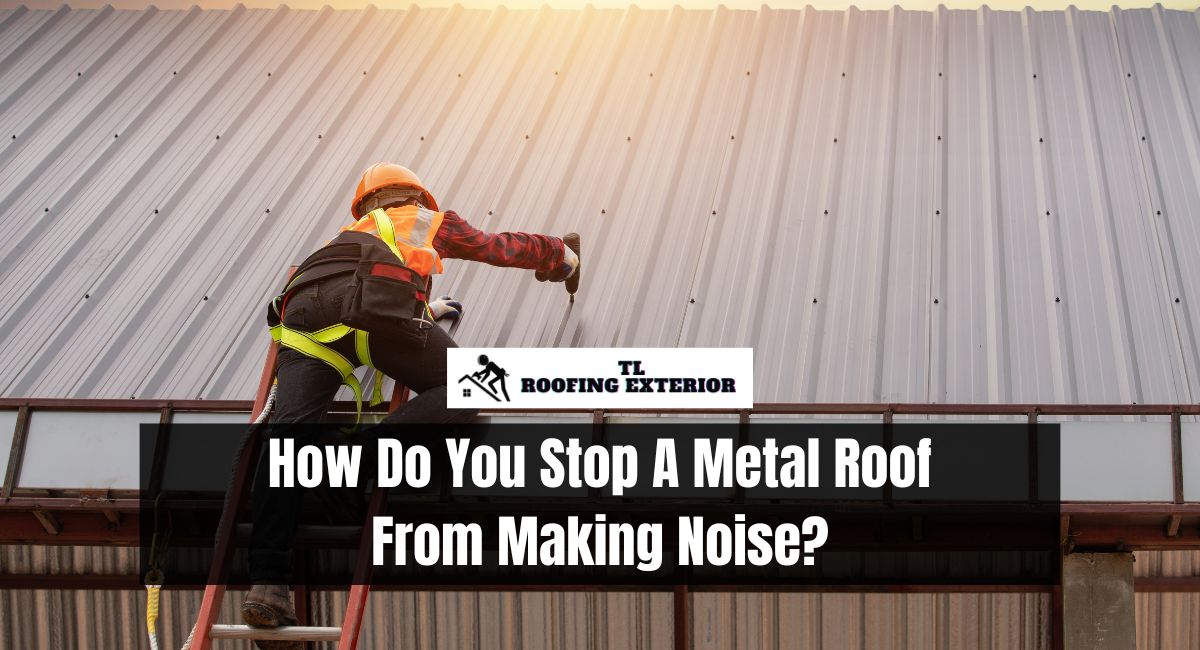Metal roofing is highly esteemed for its resilience, energy efficiency, and aesthetic appeal. However, noise is a common concern among homeowners, particularly during rainstorms and strong winds.
The sound of raindrops or detritus striking a metal surface can be amplified, resulting in an indoor environment that is noisy. So, how do you stop a metal roof from making noise?
In this article, we will check out a variety of techniques and materials that can reduce or eradicate noise from a metal roof, resulting in a quieter and more comfortable living environment.
Why Does My Metal Roof Make Loud Noises?
A metal roof can make loud noises for several reasons:
- Thermal Expansion and Contraction: Metal expands when heated and contracts when cooled. This can cause “popping” or “creaking” noises, especially during significant temperature changes.
- Wind: High winds can cause the metal panels to vibrate, creating noise.
- Rain and Hail: The impact of raindrops or hailstones can be louder on a metal surface compared to other roofing materials.
- Improper Installation: Loose fasteners or inadequate underlayment can amplify noise.
- Material Quality: Thinner metal panels are more prone to noise due to less rigidity.
If the noise is bothersome, consider adding insulation or soundproofing materials beneath the metal panels to dampen the sound.
How Do You Stop A Metal Roof From Making Noise?
Metal roofs are well known for their durability & energy efficiency, but they can also be noisy, especially during rain or hail storms. Here are some ways to reduce or eliminate noise from a metal roof:
Insulation
- Rigid Foam Insulation: Installing rigid foam insulation beneath the metal roof can significantly reduce noise levels. This not only serves as an acoustic barrier but also enhances the thermal performance of the roof.
- Spray Foam Insulation: Closed-cell spray foam insulation can be applied to the underside of the metal roof. This adheres to the metal and dampens noise-causing vibrations.
Underlayment
- Soundproofing Underlayment: Special acoustic underlayments can be installed beneath the metal roofing material. These are designed to reduce noise transmission and muffle sound.
- Rubberized Asphalt Underlayment: Rubberized asphalt underlayment can also act as a sound dampener, reducing the commotion caused by rain or hail.
Roof Fasteners
- Proper Installation: Roof fasteners that are loose can contribute to roof commotion. Ensure that fasteners and nails are properly tightened without deforming the metal.
- Rubber Washers: To mitigate vibrations, use screws with rubber washers.
Structural Barriers
- Roofing Structure: Adding more purlins or strapping can help reduce the quantity of vibrating surface area, which in turn can reduce noise.
- Ceiling: A properly insulated ceiling can also serve as an acoustic barrier. Consider installing acoustic ceiling slabs or panels beneath the metal roof.
Additional Materials
- Soundproofing Mats: These can be installed over the existing roof structure but below the metal roofing material in order to attenuate sound.
- Mass Loaded Vinyl: This is a thin but heavy vinyl sheet that can be used to attenuate sound. It can be installed on the ceiling or on the roof.
Other Considerations
- Roof Design: Curved or textured metal roofing materials can break up the flow of rainfall, reducing the drumming sound compared to flat panels.
- Quality of Material: Thicker, higher-quality metal sheets are typically less noisy than narrower, lower-quality metal sheets.
- Tree Cover: Sometimes, merely having tree branches over the roof can prevent raindrops from falling, thereby reducing impact noise.
- Professional Help: For optimal results, you should consider consulting a professional to evaluate your unique situation and recommend individualized solutions.
By implementing these strategies, you can significantly reduce the noise generated by your metal roof, making your living environment more comfortable.
How Noisy Is A Metal Roof When It Rains?
Depending on elements such as insulation, underlayment, and even the shape and size of the building, the noise level of a metal roof during rain can vary greatly. Estimates show that with sufficient insulation and underlayment, noise levels might range from 50 to 60 dB, which is equal to moderate rainfall on standard roofing materials. The sound may be louder without these noise-canceling methods.
Conclusion
Noise reduction from a metal roof is accomplished through a combination of suitable installation procedures and extra sound-dampening materials. Options include putting a layer of acoustic insulation beneath the roof and employing sound-absorbing underlayments.
Even the metal gauge and fastening procedures might have an impact on the noise levels of the roof. While some noise reduction can be accomplished by do-it-yourself methods, it may be desirable to speak with roofing specialists who are knowledgeable in noise reduction measures for the best results.
Learn More: What To Use To Seal Leaking Roof?
